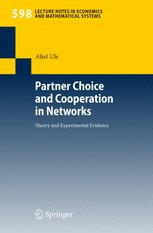

Most ebook files are in PDF format, so you can easily read them using various software such as Foxit Reader or directly on the Google Chrome browser.
Some ebook files are released by publishers in other formats such as .awz, .mobi, .epub, .fb2, etc. You may need to install specific software to read these formats on mobile/PC, such as Calibre.
Please read the tutorial at this link: https://ebookbell.com/faq
We offer FREE conversion to the popular formats you request; however, this may take some time. Therefore, right after payment, please email us, and we will try to provide the service as quickly as possible.
For some exceptional file formats or broken links (if any), please refrain from opening any disputes. Instead, email us first, and we will try to assist within a maximum of 6 hours.
EbookBell Team

4.3
18 reviewsCooperation is beneficial but may be hard to achieve in situations where the selfish interests of individuals conflict with their common goal, such as in sharing of goods, help, knowledge or information, in trade and pollution negotiations, and in exploitation of common resources. The standard models of such "social dilemmas" assume that the individuals are obliged to participate in the dilemma. These models fail to capture an important element of human interaction: that people are in general free to select their interaction partners. In this book a social dilemma with partner selection is introduced and studied with the methods of formal game theory, experimental economics and computer simulations. It allows exploration of simultaneous dynamics of the network structure and cooperative behavior on this structure. The results of this study show that partner choice strongly facilitates cooperation and leads to networks where free-riders are likely to be excluded.